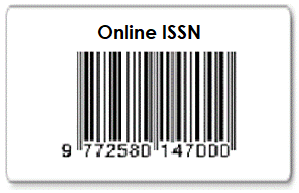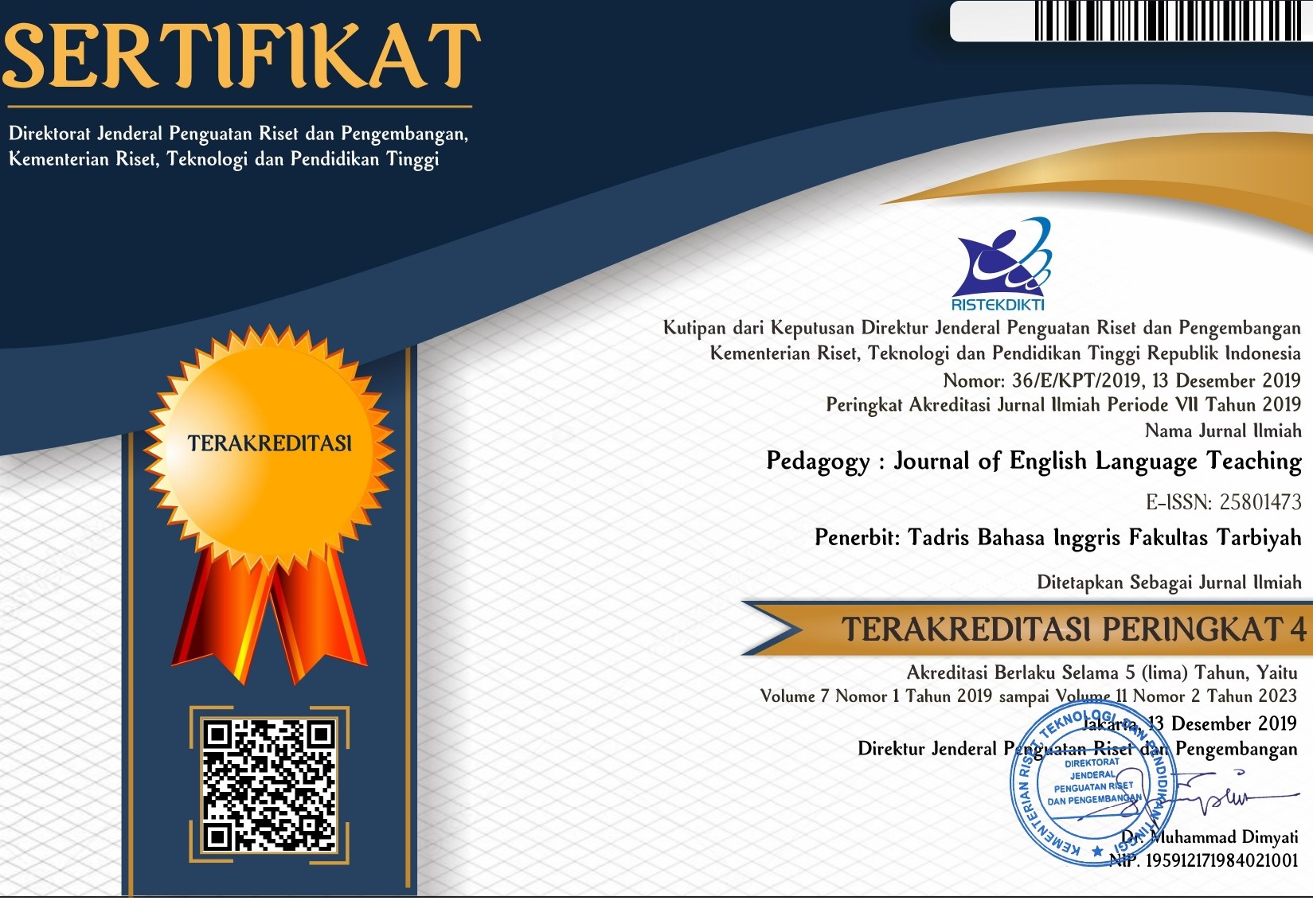Novice Teachers' Critical Incidents and Motivation to Choose Teaching Professions: A Study of Teacher Professional Identity Construction
DOI:
https://doi.org/10.32332/95z9xb80Keywords:
beliefs, critical incidents, EFL novice teacher, motivation, teacher professional identityAbstract
Novice teachers, who are in the initial stages of their career as educators, may exhibit a propensity for uncertainty regarding the execution of their professional responsibility. This is particularly dependent on their motivation and experiences accrued throughout their teaching journey. Consequently, novice teachers must engage in reflective practices concerning their professional experiences which involve their beliefs, motivations, and significant incidents that shape their professional identity development. This study involved three EFL novice teachers in elementary schools who are in their first year of teaching. This is a qualitative study that employed the Critical Incident Technique to gather and analyze the data following the five steps proposed by Hughes, William Son, & Lloyd (2007). The data were obtained using questionnaires and semi-structured interviews which were conducted online. Findings reveal that female novice teachers are more intrinsically motivated, driven by their interest in English and teaching, whereas male novice teacher is primarily motivated by his educational background and the prestige of the profession. Although all participants encountered similar critical incidents related to student behavior, teaching ability, classroom management, and teacher-teacher relationships, their responses varied. One participant viewed these challenges as opportunities for growth, while others felt demotivated, particularly when teaching elementary school students. The future career trajectories of novice teachers in education may be influenced by their reflections on these experiences.
References
Asriani, I. E., Apriliaswati, R., & Riyanti, D. (2022). Motivational Factors Influencing Pre-Service EFL Teachers to Choose Teaching as A Future Career. Jo-ELT (Journal of English Language Teaching) Fakultas Pendidikan Bahasa & Seni Prodi Pendidikan Bahasa Inggris IKIP, 9(1), 38. https://doi.org/10.33394/jo-elt.v9i1.5132
Baburajan, V., e Silva, J. de A., & Pereira, F. C. (2021). Open-Ended Versus Closed-Ended Responses: A Comparison Study Using Topic Modeling and Factor Analysis. IEEE Transactions on Intelligent Transportation Systems, 22(4), 2123–2132. https://doi.org/10.1109/TITS.2020.3040904
Beauchamp, C., & Thomas, L. (2009). Understanding teacher identity: an overview of issues in the literature and implications for teacher education. Cambridge Journal of Education, 39(2), 175–189. https://doi.org/10.1080/03057640902902252
Butterfield, L. D., Borgen, W. A., Maglio, A.-S. T., & Amundson, N. E. (2009). Using the Enhanced Critical Incident Technique in Counselling Psychology Research. Canadian Journal of Counselling, 43(4), 265-282.
Campbell, S., Greenwood, M., Prior, S., Shearer, T., Walkem, K., Young, S., Bywaters, D., & Walker, K. (2020). Purposive sampling: complex or simple? Research case examples. Journal of Research in Nursing, 25(8), 652–661. https://doi.org/10.1177/1744987120927206
Cendra, A. N. (2019). Indonesian Novice English Teachers’ Identity Formation. IJET (Indonesian Journal of English Teaching), 8(1), 41–53. https://doi.org/10.15642/ijet2.2019.8.1.41-53
Tripp, D. (1993). Critical Incidents in Teaching: Developing Professional Judgement. Routledge.
Diasti, K. S. (2021). Constructing Professional Identity: Investigating Stress Factors and Resilience Experienced by EFL Novice Teachers. Scholaria: Jurnal Pendidikan Dan Kebudayaan, 11(1), 1–10. https://doi.org/10.24246/j.js.2021.v11.i1.p1-10
Estaji, M., & Fatalaki, J. A. (2022). Teacher Educators’ Perceptions of Critical Incidents in Teaching Practice: The Case of Novice EFL Teachers. East European Journal of Psycholinguistics, 9(1). https://doi.org/10.29038/eejpl.2022.9.1.est
Geer, J. G. (2015). What Do Open-Ended Questions Measure? Public Opinion Quarterly, 52. http://poq.oxfordjournals.org/
Hanifah, M., Damayanti, I. L., & Muslim, A. B. (2022). Indonesian English Novice Teachers’ Identity Constructions and Their Teaching Practices. International Journal of Education, 15(1), 38–49. https://doi.org/10.17509/ije.v15i1.46155
Hong, J., Day, C., & Greene, B. (2018). The construction of early career teachers’ identities: coping or managing? Teacher Development, 22(2), 249–266. https://doi.org/10.1080/13664530.2017.1403367
Hughes, H., Lipu, S., Willimason, K., & Lloyd, A. (2008). Chapter 4: Exploring methods in information literacy research. http://www.csu.edu.au/faculty/educat/sis/CIS/3356/index.htm
Jennifer, J., & Mbato, C. L. (2020). Critical Incidents in Pre-Service Teachers’ Beliefs and Motivation to Become English Teachers: A Study of Teacher Professional Identity Construction. Ethical Lingua: Journal of Language Teaching and Literature, 7(1), 112–127. https://doi.org/10.30605/25409190.172
Joshi, K. R. (2018). Critical Incidents for Teachers’ Professional Development. Journal of NELTA Surkhet, 5, 82–88. https://doi.org/10.3126/jns.v5i0.19493
Kallio, H., Pietilä, A., Johnson, M., & Kangasniemi, M. (2016). Systematic methodological review: developing a framework for a qualitative semi‐structured interview guide. Journal of Advanced Nursing, 72(12), 2954–2965. https://doi.org/10.1111/jan.13031
Ke Lomi, A. N., & Mbato, C. L. (2020). Struggles and Strategies in Constructing Professional Identity: The First-Year Teaching Experiences of Indonesian EFL Novice Teachers. Journal of English Education and Teaching, 4(1), 1–19. https://doi.org/10.33369/jeet.4.1.1-19
Lap, T. Q., Ngoc, T. D., & Thao, L. T. (2022). Novice Teachers’ Professional Identity Reconstruction. International Journal of Educational Methodology, 8(3), 449–464. https://doi.org/10.12973/ijem.8.3.449
Mahmoudi, F., & Özkan, Y. (2015). Exploring Experienced and Novice Teachers’ Perceptions about Professional Development Activities. Procedia - Social and Behavioral Sciences, 199, 57–64. https://doi.org/10.1016/j.sbspro.2015.07.487
Patton, M. Q. (n.d.). Enhancing the Quality and Credibility of Qualitative Analysis.
Pravita, A. R., & Kuswandono, P. (2021). Exploring English Novice Teachers’ Identity Transformation Influenced by Community of Practice.
Strom, K. J., Martin, A. D., & Villegas, A. M. (2018). Clinging to the Edge of Chaos: The Emergence of Practice in the First Year of Teaching. Teachers College Record: The Voice of Scholarship in Education, 120(7), 1–32. https://doi.org/10.1177/016146811812000701
Suryani, A. (2020). “I chose teacher education because…”: a look into Indonesian future teachers. Asia Pacific Journal of Education, 1–19. https://doi.org/10.1080/02188791.2020.1783202
Thomson, M. M., & Berger, J.-L. (2021). Comparative Perspectives on Motivations and Values Among Novice Teachers. IAFOR Journal of Psychology & the Behavioral Sciences, 7(1), 51–65. https://doi.org/10.22492/ijpbs.7.1.04
Upa, Y., & Mbato, C. L. (2020). English Teacher Identity Construction: Indonesian Teachers’ Motivation and Strategies in Teaching English for Special Needs Students. PROJECT (Professional Journal of English Education), 3(2), 311. https://doi.org/10.22460/project.v3i2.p311-321
van der Wal, M. M., Oolbekkink-Marchand, H. W., Schaap, H., & Meijer, P. C. (2019). Impact of early career teachers’ professional identity tensions. Teaching and Teacher Education, 80, 59–70. https://doi.org/10.1016/j.tate.2019.01.001
Wang, D., & Zhang, L. J. (2021). Sustainability as a goal in teaching workforce retention: Exploring the role of teacher identity construction in preservice teachers’ job motivation. Sustainability (Switzerland), 13(5), 1–16. https://doi.org/10.3390/su13052698
Warner, C. K. (n.d.). Constructions of Excellent Teaching: Identity Tensions in Preservice English Teachers.
Wilson, C. (2014). Semi-Structured Interviews. In Interview Techniques for UX Practitioners (pp. 23–41). Elsevier. https://doi.org/10.1016/B978-0-12-410393-1.00002-8
Downloads
Published
Issue
Section
License
Copyright (c) 2025 Natalia Destiana Putri, Concilianus Laos Mbato , Ouda Teda Ena

This work is licensed under a Creative Commons Attribution-ShareAlike 4.0 International License.
















